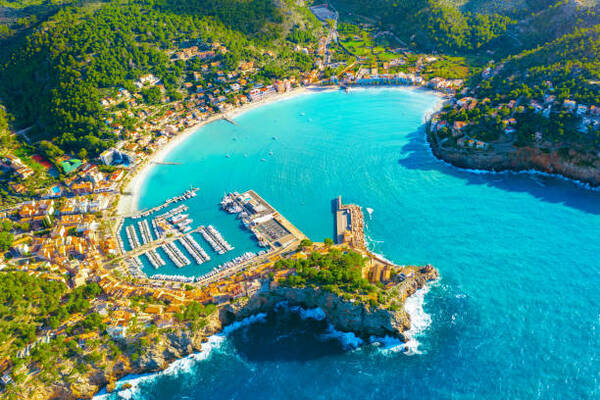Home » Spain Travel News » Spain Takes The Lead In Responsible Sports Tourism As Mallorca’s Strategic Focus On Sustainability Ensures A Greener, More Resilient Tourism Industry
Published on
September 23, 2025
Spain is emerging as a leader in responsible sports tourism, with Mallorca at the forefront. The island’s strategic focus on sustainability through high-profile sports events not only promotes year-round tourism but also ensures long-term environmental and economic resilience. This approach fosters a greener, more balanced tourism model that benefits both visitors and local communities.
Mallorca, as part of Spain, is positioning itself as a global leader in responsible sports tourism by integrating sustainability into its broader national tourism strategy. Through high-profile international sporting events, the island is not only attracting visitors to Spain but also promoting long-term environmental and economic resilience, while fostering a nationwide commitment to sustainability across communities. This approach aligns with Spain’s broader goals to create a more responsible and sustainable tourism model that benefits both local populations and the environment.
The island’s climate, stunning landscapes, and state-of-the-art infrastructure make it an ideal destination for a wide range of sports tourism, from amateur athletes to professional competitions. Mallorca’s strategic alignment of sports events with a broader sustainability vision helps establish the island as a model for tourism that prioritizes responsibility and community welfare. Events like the Mallorca Championships showcase the island’s dual focus on tourism and sustainable development. These events provide the perfect platform for promoting the island’s Pledge for Responsible Tourism, a key element in transforming Mallorca into a more equitable and eco-conscious destination.
The Pledge for Responsible Tourism, a framework developed by local authorities in collaboration with the Responsible Tourism Foundation of Mallorca, serves as a blueprint for the island’s sustainable future. It emphasizes principles of mutual respect, shared responsibility, and the protection of Mallorca’s natural, cultural, and social heritage. This pledge encourages a collective effort from all sectors of society—government bodies, tourism-related businesses, residents, and visitors—who are urged to treat the island as if it were their own home. By working together, stakeholders can ensure the island remains a vibrant, sustainable destination for future generations.
Mallorca’s strategy to integrate sports into its sustainability efforts has led to significant benefits for both the environment and the local community. The island’s sporting tourism sector promotes a more balanced flow of visitors, extending beyond peak seasons to alleviate pressure on local infrastructure. This shift helps diversify the local economy and supports the development of a tourism calendar that is less reliant on seasonal fluctuations, fostering a more stable and resilient economic environment.
In addition to the environmental benefits, this approach enhances the visitor experience by offering a wide variety of activities that blend sports, local culture, and natural exploration. Tourists are encouraged to engage in more than just athletic events; they also have the opportunity to enjoy Mallorca’s rich culinary traditions, experience local craftsmanship, and explore its diverse natural landscapes. This holistic approach to tourism enriches the island’s offering, positioning it as a destination that promotes both quality of life and sustainable travel.
Mallorca’s investment in world-class infrastructure is another key factor in its success as a sports tourism hub. The island has developed an extensive range of facilities designed to cater to both elite athletes and recreational enthusiasts. These include over 700 tennis courts spread across 60 federated clubs, 24 golf courses, and a 2,300-kilometer cycling network that spans four designated zones. In addition, the island is home to 1,460 sports pools, 452 padel courts, 74 football fields, and five velodromes, creating a comprehensive sports infrastructure that meets a diverse range of needs. The presence of a PGA Training Academy further underscores Mallorca’s commitment to high-performance sports and its capacity to support long-term athletic development.
This extensive infrastructure not only attracts sports tourism but also serves the local population, providing community access to high-quality facilities and encouraging active lifestyles. By balancing the needs of both residents and visitors, Mallorca ensures its sports infrastructure is sustainable and supports both tourism and the community’s well-being.
Central to Mallorca’s strategy is the collaborative approach to tourism transformation. The island actively fosters public-private partnerships, where local enterprises collaborate with organizations like the Responsible Tourism Foundation to integrate sustainability into development plans. These partnerships focus on innovation, digital transformation, and the circular economy, all of which are key to ensuring that tourism in Mallorca evolves in a way that is both environmentally responsible and economically viable. By embracing these forward-thinking strategies, Mallorca is better equipped to adapt to changing visitor expectations and the challenges posed by climate change.
The island’s dedication to sustainability is a testament to the belief that tourism, when managed responsibly, can be a force for good. The Pledge for Responsible Tourism represents a shared commitment to preserving the island’s unique assets, ensuring that Mallorca remains a beautiful, vibrant destination while meeting the evolving needs of the global travel community.
As Mallorca continues to develop as a leading sports tourism destination, it remains deeply committed to sustainability. The island’s approach demonstrates that tourism and sustainability are not mutually exclusive but can complement each other to create long-lasting economic and environmental benefits. Through its responsible tourism initiatives, Mallorca is not only securing its future as a premier destination but also setting an example for other regions looking to harmonize tourism growth with environmental and social responsibility. By maintaining this balance, Mallorca ensures that it remains not just a place to visit, but a place to call home for generations to come.
